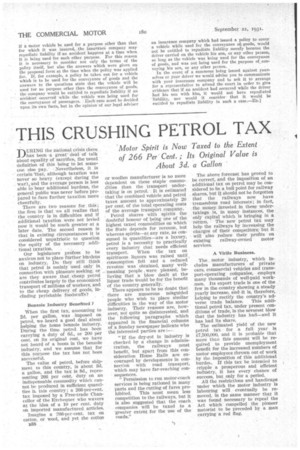THIS CRUSHING PETROL TAX
Page 56

If you've noticed an error in this article please click here to report it so we can fix it.
Motor Spirit is Now Taxed to the Extent of 266 Per Cent. ; Its Original Value is About 3d. a Gallon
TAURING the national crisis there .1.-/hits been -a great deal" of talk about equality of sacrifice, the usual definition of this being to let some
one else pay. Nevertheless, it is certain 'that,althotigh taxation was never • so heavy (except during the war), and the average person is less able to bear additional burdens, the general public was never before prepared tciltice further taxation more cheerfully.
There are two reasons for this; the first is that we all realize that the country is in difficulties and if additional taxation were not levied DOW it would be mu& greater .at a later date. The second reason is that in existing circumstances it is considered unpatriotic to question the equity of the necessary addi
tional taxation. .
Our legislators profess to be anxious not to place further bbrdens on industry. Do they still think that petrol is mainly used only in connection with pleasure seeking, or are they aware that cheap petrol contributes largely to the economical transport of millions of workers, and to the cheap delivery of goods, including perishable foodstuffs?
Benzoie Industry Benefited ?
When the first tax, amounting to 2d. per gallon, was imposed on petrol, we heard a good deal about helping the home benzole industry. During the time petrol has been carrying a duty of 6d., or 200 per cent. on its original cost, we have not heard of a boom in' the benzole industry, and we assume that for this. purpose the tax has not been successful.
The value of petrol, before shipment to this country, is about 3d. a gallon, and the tax is 8d., representing 266 per cent. duty on an indispensable commodity which cannot be produced in sufficient quantities in this country ; a 266-per-cent. tax imposed by a Free-trade Chancellor of the Exchequer who wavers at the idea of a 10 per cent, duty on imported manufactured articles.
Imagine a 206-per-cent. tax on cotton, or wool, and yet the cotton 3328 or woollen manufacturer is no more dependent on these staple commodities than the transport undertaking is on petrol. . It is estimated that the combined vehicle and petrol taxes amount to approximately 20 per cent, of the total operating costs of the average transport company. • . Petrol shares with spiritsthe doubtful honour of tieing one of the highest taxed commodities on which the State depends for revenue, but whereas spirits—at any rate, as consumed in quantities—are a luxury, petrol is a necessity to practically every industry that needs efficient transport. When the tax on spirituous liquors was raised until , consumption fell and a reduced revenue was obtained, many wellmeaning people , were pleased; believing that A blow dealt at the liquor trade Would be for the benefit of the country generally.
There appears to be no doubt that there are numerous misguided people who wish to place similar difficulties in the way of the motor industry. Their reasons are, however, not quite so disinterested, and the following paragraphs which appeared in the financial columns of a Sunday newspaper indicate who the interested parties are "If the dry-rot in industry is checked by a change in administration, the railways must benefit, but apart from this consideration Home Ralik are encouraged by developments in connection • with road transport, which may have far-reaching consequences.
" Permission to run motor-coach services is being rationed in many parts and the cutting of fares pro
hibited. This must mean less competition to the railways, but it is also suggested that the coach companies will be taxed to a --greater extent for the use of the roads." The above forecast has proved to be correct, and the imposition of an additional tax on petrol may be considered to be a bull point for railway shares, but it should not be forgotten that the railways now have tremendous road interests; in fact, the money invested in these undertakings is, in many instances, the only capital which is bringing in a return. The new petrol tax may help the railways by increasing the charges of their competitors; but it will also reduce their profits on existing railway-owned motor services.
A Virile Business.
The motor industry, which includes manufacturers of private cars, commercial vehicles and transport-operating companies, employs many thousands of well-paid workmen. Its export trade is one of the few in the country showing a steady yearly increase, and it is, therefore, helping to rectify the country's ad
verse trade balance. This additional petrol tax, under present conditions of trade, is the severest blow that the industry has had—and it has had its share.
The estimated yield of the new petrol tax for a full year is £7,500,000, and it is probable that more that' this amount will be required to provide unemployment benefit for the increased numbers of motor employees thrown out of work by the imposition of this additional burden. If this tax be intended to cripple a prosperous and efficient industry, it has every chance of success, but only for a period.
All the restrictions and handicaps under which the motor industry is labouring will eventually be removed, in the same manner that it was found necessary to repeal the Act which compelled the pioneer motorist to be preceded by a man carrying a red flag.




































































































